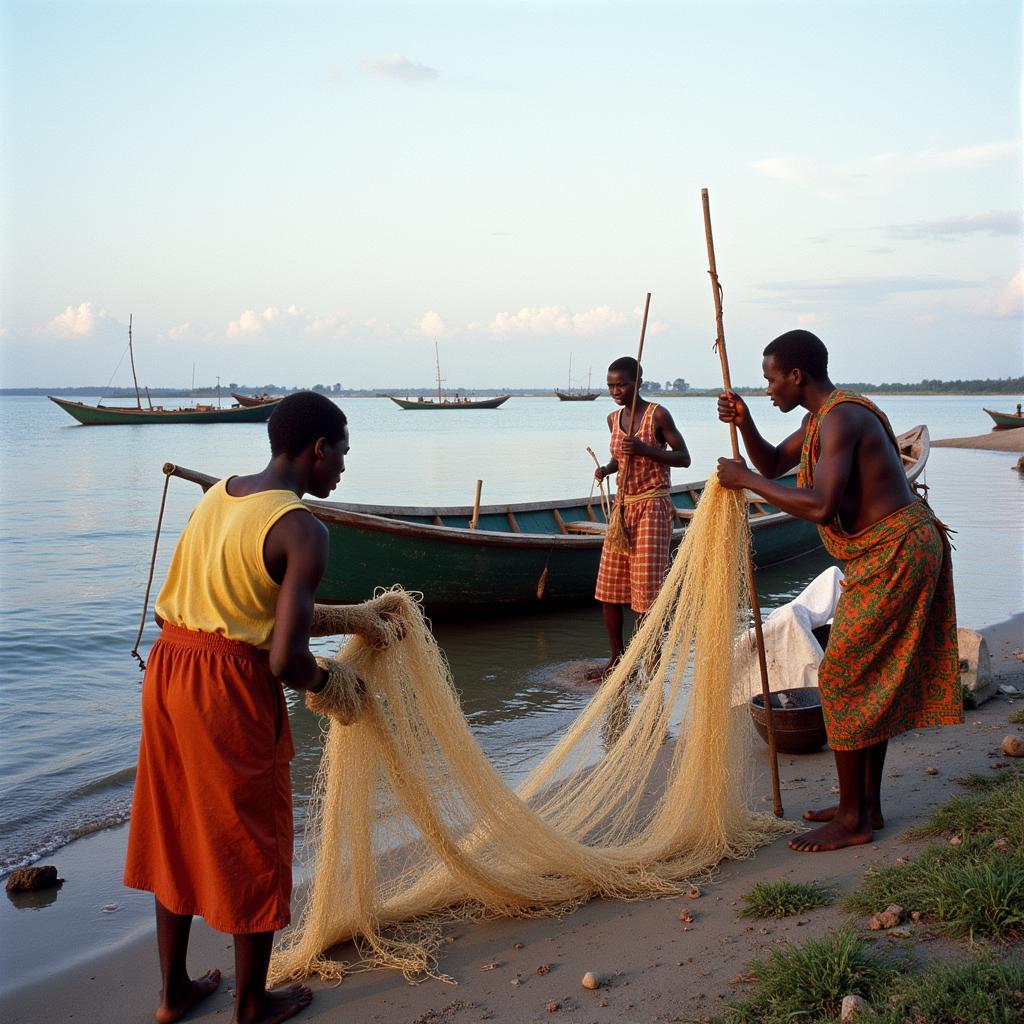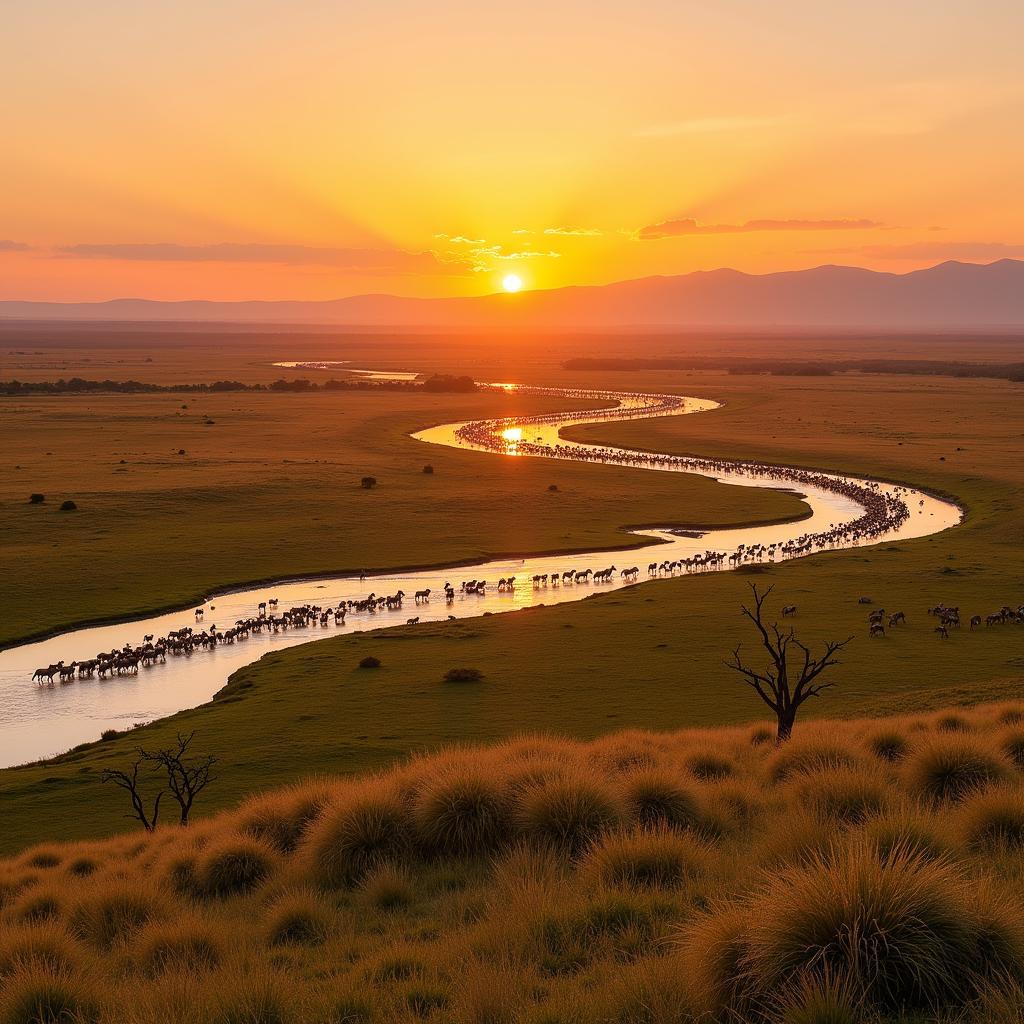Exploring Africa’s Rich Heritage: A Deep Dive into African Fishing Tribes
Africa, a continent teeming with diverse cultures and traditions, is home to numerous fishing tribes whose lives are intricately intertwined with the water. These communities, scattered across the continent’s vast coastlines and along its intricate network of rivers and lakes, offer a unique glimpse into a way of life shaped by the rhythms of the water. From ancient fishing techniques passed down through generations to vibrant rituals celebrating the bounty of the sea, African Fishing Tribes hold a special place in the continent’s rich tapestry of human experience.
The Inseparable Bond Between African Fishing Tribes and Water
For many African fishing tribes, the relationship with water goes beyond mere sustenance. It’s a spiritual connection, a source of identity, and a foundation upon which their entire culture is built. Their deep understanding of aquatic ecosystems, honed over centuries, allows them to sustainably harvest the resources the water provides. This intimate knowledge extends beyond fishing to encompass navigation, boat building, and even weather prediction. These skills, often passed down orally from elder to younger generations, are essential for their survival and prosperity.
The lives of these communities are often dictated by the seasons, the tides, and the migratory patterns of fish. Their daily routines revolve around fishing activities, from preparing nets and boats to venturing out into the open water or navigating the intricate channels of inland waterways.
 African fishermen preparing nets on Lake Victoria
African fishermen preparing nets on Lake Victoria
Diverse Fishing Techniques of African Fishing Tribes
African fishing tribes employ a fascinating array of fishing techniques, each adapted to the specific environment and the types of fish they target. Some tribes specialize in traditional methods like spear fishing, using handcrafted spears to catch fish with remarkable precision. Others use elaborate net fishing techniques, deploying large nets from canoes or from the shore to capture schools of fish. In some regions, fish traps and weirs are cleverly constructed to passively catch fish as they migrate along rivers or coastlines. These diverse methods not only reflect the ingenuity of these communities but also demonstrate their deep understanding of the aquatic ecosystems they inhabit.
Cultural Significance of Fishing in African Societies
Fishing is more than just an economic activity for these tribes; it’s deeply embedded in their cultural and spiritual beliefs. Many tribes have elaborate rituals and ceremonies related to fishing, often invoking the spirits of the water for a bountiful catch. These ceremonies can involve traditional dances, music, and offerings to appease the gods and ensure the continued prosperity of the community. The fish itself often holds symbolic meaning, representing abundance, fertility, or even connection to the ancestral world.
“Fishing is not simply about catching fish,” explains Dr. Abimbola Oladeji, a renowned anthropologist specializing in African cultures. “It’s about maintaining a harmonious relationship with the natural world and honoring the spirits that provide for them.”
The role of fishing extends beyond sustenance and spirituality. It also plays a significant role in social structures. In many fishing tribes, fishing is a communal activity, with families and even entire villages working together to bring in the catch. This shared experience fosters strong social bonds and reinforces a sense of collective identity. african jheel
Facing Modern Challenges: African Fishing Tribes in the 21st Century
Despite their deep connection to the water, African fishing tribes face numerous challenges in the modern era. Overfishing, pollution, and climate change pose significant threats to their traditional way of life. Competition from large-scale commercial fishing operations often puts immense pressure on local fish stocks, making it increasingly difficult for traditional fishermen to maintain their livelihoods. The impact of climate change, manifested in rising sea levels, altered rainfall patterns, and changes in fish migration, further exacerbates these challenges.
“The future of these communities depends on sustainable fishing practices and the preservation of their traditional knowledge,” emphasizes Dr. Oladeji. “It’s crucial that we support their efforts to adapt to these changing times while respecting their cultural heritage.”
Conclusion: Preserving the Legacy of African Fishing Tribes
African fishing tribes represent a vital part of the continent’s cultural heritage. Their intimate relationship with water, their ingenious fishing techniques, and their rich traditions offer a unique perspective on human adaptation and resilience. Preserving their way of life is not only about protecting their cultural heritage but also about ensuring the sustainable management of aquatic resources for future generations. By understanding and supporting these communities, we can help ensure that their ancient traditions continue to thrive in the face of modern challenges.
FAQ
- What are the main challenges facing African fishing tribes? Overfishing, pollution, and climate change.
- What are some traditional fishing techniques used by African tribes? Spear fishing, net fishing, and fish traps.
- How is fishing connected to the cultural beliefs of African fishing tribes? Through rituals, ceremonies, and symbolic meanings.
- What is the importance of preserving the traditions of African fishing tribes? To protect cultural heritage and ensure sustainable resource management.
- How do African fishing tribes adapt to changing environmental conditions? By adapting fishing techniques and advocating for sustainable practices.
- What role does fishing play in the social structure of African fishing tribes? It fosters social bonds and reinforces collective identity.
- How can we support African fishing tribes? By promoting sustainable fishing practices and respecting their cultural heritage.
Need assistance? Contact us at:
Phone Number: +255768904061
Email: kaka.mag@gmail.com
Address: Mbarali DC Mawindi, Kangaga, Tanzania.
We have a 24/7 customer service team.


